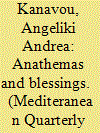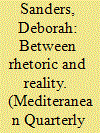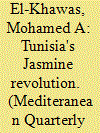|
|
|
Sort Order |
|
|
|
Items / Page
|
|
|
|
|
|
|
| Srl | Item |
| 1 |
ID:
118582


|
|
|
|
|
| Publication |
2012.
|
| Summary/Abstract |
This essay highlights the role of contingent provisions in the London-Zurich Agreements, which established the Republic of Cyprus, in damaging the future chances for a smoothly functioning state of affairs between the ethnic groups on Cyprus. By allowing contentious elements such as geographic division of municipalities, allocation of sovereign territory by a colonial power (the British), taxation and allocation of resources for the two communities to manage their affairs separately, the extent of integration of the armed forces, and the ratio of participation in the civil service, these provisions set up the young republic for turmoil. A powerful lesson emerges for constitutive arrangements as ethnic groups are driven to the negotiating table. The reluctance of drafters of agreements to address contentious issues sets up the conditions for reignition of conflict. To the extent issues are not addressed, a conflict simply continues by "other means," and peace is merely imagined.
|
|
|
|
|
|
|
|
|
|
|
|
|
|
|
|
| 2 |
ID:
118580


|
|
|
|
|
| Publication |
2012.
|
| Summary/Abstract |
As a powerful littoral state with important security interests in the Black Sea, Russia has the ability to use the maritime domain to advance and protect its interests, which will affect regional and international security. Using the currently available literature, this essay examines the three factors that shape and affect Russia's maritime power in the Black Sea: quantitative factors such as the number and capability of maritime platforms as well as access to maritime infrastructure; qualitative factors such as the morale of maritime personnel; and the strategic context in which Russia exercises its maritime power. It argues that Russian maritime power is likely to decline significantly. Not only will Russia have significantly fewer maritime platforms in the future, but its ability to use the maritime domain will be compromised by qualitative problems and poor relations with the United States and littoral states such as Georgia and Romania.
|
|
|
|
|
|
|
|
|
|
|
|
|
|
|
|
| 3 |
ID:
118579


|
|
|
|
|
| Publication |
2012.
|
| Summary/Abstract |
Iran's historical flirtation with democracy has been one of thwarted desires. The 1906 Constitutional Revolution introduced the concepts of liberal democracy to Iranian society, but success was limited by the lack of support from the ulama (clergy). After decades of authoritarianism, under both the Pahlavi family and the ayatollahs, Iran has little experience with modern democratic institutions. It is the argument of the authors that without a fully formed civil society, the lack of progress toward democracy will be prolonged, unless the religious elite come to consider democracy to be in Iran's best interest. Given the seemingly domino-like effect of the Arab Spring, the ulama of Iran may not have much time before the push for democracy becomes an issue.
|
|
|
|
|
|
|
|
|
|
|
|
|
|
|
|
| 4 |
ID:
118581


|
|
|
|
|
| Publication |
2012.
|
| Summary/Abstract |
This essay considers whether genocide is a neglected area of criminological inquiry. After a brief history of its evolution and definition, genocide is considered alongside other crimes against international law, including international human rights law (specifically, war crimes and crimes against humanity). The essay reviews contemporary perceptions of international crimes in established academic literature. Specific consideration is made of the incidence of genocide in Rwanda and the former Yugoslavia. Genocide is considered across three broad areas: as an issue of law (no crime without law); the nature of the offenders (state, agents of the state, and mass participation); and the nature of the phenomenon itself (with reference to Rwanda and Yugoslavia). Finally, this essay considers whether criminology has neglected genocide and suggests ways of improving academic engagement on this issue.
|
|
|
|
|
|
|
|
|
|
|
|
|
|
|
|
| 5 |
ID:
118578


|
|
|
|
|
| Publication |
2012.
|
| Summary/Abstract |
Tunisians were the first in the region to oust a long-time dictator, one who had ruled the country for twenty-three years. It was a genuine popular revolution, started without a leader, and was nonpolitical, nonideological, and nonreligious. After toppling President Zine El Abidine Ben Ali's regime, new political parties were established and free and fair multiparty elections were held, a giant step forward in the march toward democracy. The economy continues to be a deep source of discontent, however. Youth blame the government's inaction for continued unemployment. The Ennahda-led coalition needs to get the right mix of resources to make progress in reducing unemployment. Tunisians cannot do it alone; external assistance is badly needed.
|
|
|
|
|
|
|
|
|
|
|
|
|
|
|
|
|
|
|
|
|